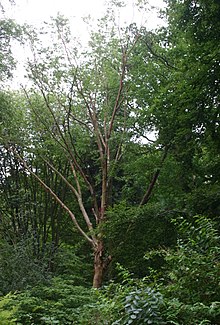| Betula albosinensis | |
|---|---|

| |
| Chinese red birch | |
| Scientific classification | |
| Kingdom: | Plantae |
| Clade: | Tracheophytes |
| Clade: | Angiosperms |
| Clade: | Eudicots |
| Clade: | Rosids |
| Order: | Fagales |
| Family: | Betulaceae |
| Genus: | Betula |
| Subgenus: | Betula subg. Neurobetula |
| Species: | B. albosinensis |
| Binomial name | |
| Betula albosinensis Burkill | |
Betula albosinensis, commonly known as the Chinese red birch, is a species of birch in the family Betulaceae, native to Western China. It is notable for its distinctive peeling bark and is cultivated as an ornamental tree.
Description
Betula albosinensis is a deciduous tree that can grow up to 25 m (82 ft) in height, with some specimens reaching 18 to 27 m (60 to 90 ft). The trunk can reach a circumference of 1.8 to 3.4 m (6 to 11 ft).
Bark
A distinctive feature is the red birch's peeling bark, which is brown but cream when newly exposed. The bark has been described as bright orange to orange-red, peeling off in very thin sheets. Each new layer of bark is covered with a white glaucous bloom, giving it a unique appearance.
Leaves
The leaves are ovate, 5 to 7.6 cm (2 to 3 in) long and 2.5 to 3.8 cm (1 to 1.5 in) wide, with a slender point and rounded base. They have unevenly jagged teeth along the edges and 9 to 14 pairs of veins. Young leaves have hair between the veins, becoming smooth (glabrous) with age.
Catkins
Brown catkins are produced in Spring. Male catkins are 3.8 to 6.4 cm (1.5 to 2.5 in) long, while female catkins are 2.5 to 3.8 cm (1 to 1.5 in) long and about 8 mm (1/3 in) wide. Female catkins are usually solitary, sometimes in pairs.
Other features
Young shoots are slightly glandular, becoming dark brown and smooth with scattered warts as they age.
Taxonomy
Betula albosinensis was first described by Burkill in 1899 in the Journal of the Linnean Society. The Latin specific name albosinensis means "white, from China".
Synonyms include B. bhojpattra var. sinensis and B. utilis var. sinensis.
Recent taxonomic revisions have proposed reclassifying this taxon as Betula utilis subsp. albosinensis (Burkill) Ashburner & McAll. This reclassification was published in Ashburner & McAllister's 2013 work "The genus Betula: a taxonomic revision of birches". This classification is accepted by the World Flora Online (WFO) and Plants of the World Online (POWO).
Distribution and habitat
Betula albosinensis is native to Western China. More specifically, it is found in North-Central China, South-Central China, Southeast China, and Inner Mongolia. It grows primarily in temperate biomes.
Uses
Cultivation
Betula albosinensis is grown as an ornamental tree for parks and large gardens, valued for its striking bark. It was first introduced to cultivation in the West by E.H. Wilson in 1901, who collected specimens in Western Hupeh (now Hubei) province.
Numerous cultivars have been produced. The cultivars 'Fascination' and 'Red Panda' have gained the Royal Horticultural Society's Award of Garden Merit.
Gallery
References
- ^ "Betula albosinensis". The Plant List. Retrieved 22 January 2018.
- ^ RHS A-Z encyclopedia of garden plants. United Kingdom: Dorling Kindersley. 2008. p. 1136. ISBN 978-1405332965.
- ^ Trees and Shrubs Online. Betula albosinensis. https://www.treesandshrubsonline.org/articles/betula/betula-albosinensis/
- Linnean Society of London.; London, Linnean Society of (1889). The Journal of the Linnean Society. Botany. Vol. v.26 (1889-1890). London : the Society: Longman, Green, Longman, Roberts & Green.
- Harrison, Lorraine (2012). RHS Latin for Gardeners. United Kingdom: Mitchell Beazley. ISBN 978-1845337315.
- ^ Plants of the World Online (POWO). Betula utilis subsp. albosinensis. https://powo.science.kew.org/taxon/urn:lsid:ipni.org:names:77128714-1
- Ashburner, K. & McAllister, H.A. (2013). The genus Betula: a taxonomic revision of birches: 1-431. Royal Botanic Gardens, Kew.
- World Flora Online (WFO). Betula utilis subsp. albosinensis. https://wfoplantlist.org/taxon/wfo-0001362561-2024-06
- "Betula 'Fascination'". RHS. Retrieved 12 April 2020.
- "RHS Plantfinder - Betula albosinensis 'Red Panda'". Royal Horticultural Society. Retrieved 21 January 2018.


